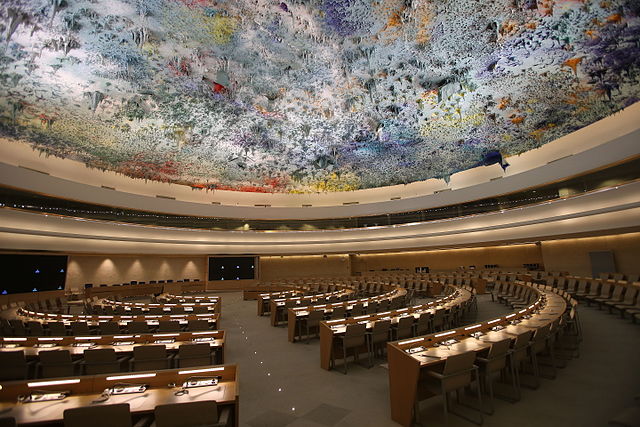
By DaQuan Lawernce, Special to the AFRO
Internationally, some nations with substantial racial or ethnic variation among their populations have acknowledged that addressing issues of racism, institutional or interpersonal, should be a priority.
Seeking to continue the Biden Administration’s efforts to confront global systemic racism and injustice, in June 2022, Secretary of State Anthony Blinken appointed Desirée Cormier Smith as the first Special Representative for Racial Equity and Justice (SRREJ) in U.S. history.
Smith discussed her first six months in office in a one-on-one interview with the AFRO.
“Special Representative Cormier Smith will lead our efforts to protect and advance the human rights of people belonging to marginalized racial and ethnic communities and combat systemic racism, discrimination, and xenophobia around the world” and “also ensure that our own policies are protecting and advancing the rights of people belonging to marginalized racial and ethnic communities,” Blinken said.
“I was relieved to see an office created to look at the situation of marginalized racial and ethnic communities around the world. We didn’t have that, and I felt like it was a blind spot in our foreign policy. I never expected to be asked to serve in this capacity and I am honored to be the first one.” Smith said.
House Foreign Affairs Committee Chairman Gregory W. Meeks (D-N.Y.), and Senate Foreign Relations Committee Chairman Bob Menendez (D-N.J.) praised the Biden Administration’s creation of the new position in a joint statement saying the “appointment will play a critical role in streamlining our efforts to secure human rights and fight inequality around the world.”
Despite the obvious existence of racism, and the relevance and significance of her role, some policy experts consider racism as a theoretical claim and have criticized the Administration’s decision citing cost issues, resentment within State’s existing bureaucracy, and misunderstanding among foreign governments concerning who really creates policy.
The United Nations (UN) Office of the High Commissioner for Human Rights recently acknowledged that lived experiences are key to achieving racial justice and equality, with Acting High Commissioner Nada Al-Nashif presenting a UN human rights report on racial justice and equality for Africans and people of African descent.
“This appointment was really humbling but I carry my responsibilities with great joy and humility. I find comfort knowing that I’m not the only one doing this work” Smith said. “There are countless activists in civil society, and inside and outside of government. They might not have the same title, but we’re working towards the same things” she continued.
Smith’s background as a Los Angeles native, member of marginalized communities, professional experience as well as her passion and commitment to improving social and economic conditions for marginalized populations, make her appointment as America’s first SRREJ more ideal, timely, poignant and critical.
Smith is a graduate of Stanford University and Harvard’s Kennedy School of Government, with public and private sector experience working in the U.S. Foreign Service in Mexico, South Africa, and Washington, D.C., in the Bureau of International Organization Affairs and at the Open Society Foundations.
Since her June appointment, Smith has been extremely busy working to advance equity in the frontiers of diplomacy, foreign policy and international public policy, including working with racial and ethnic communities around the world and with the UN on the newly established Permanent Forum for People of African Descent (PFPAD).

Over the last six months, Smith has worked across continents to advance and protect the human rights of racial and ethnic marginalized communities. She was a member of the U.S. Presidential Delegation to the inauguration of Francia Marquez, Colombia’s first Black vice president; worked to support marginalized ethnic populations around the world including people of African descent and Indigenous communities; and worked with members of civil society at international forums and conferences such as the U.S.-Africa Leaders Summit.
“Even though my mandate does not include a domestic policy focus, my credibility to do this work globally depends on how we’re doing here in the U.S. In order for us to credibly talk about how racial equity is needed overseas in other countries, we have to also practice that here at home.” Smith said.
Smith has also been heavily involved UN human rights initiatives focused on racial equity, and co-led the U.S. delegation at the UN Committee on the Elimination of Racial Discrimination meetings at the OHCHR in Geneva; participated in the UN Educational, Scientific, and Cultural Organization (UNESCO) Global Forum against Racism and Discrimination in Mexico, and supported the inaugural sessions of the PFPAD in Geneva.
“I have built a small but mighty team, and I’m very proud of what we’ve been able to accomplish. We’re in the process of evaluating as we head into the new year,” Smith said, reflecting on her first six months as the first SRREJ in U.S. history.
Considering lessons learned through her career and upcoming work in 2023, Smith said “It’s important that we bring our lived experiences to work. I have been able to relate with people from around the world, because I can see myself in them and they see themselves in me.”
“I lead with humility and explain that I cannot admonish other governments because that shuts down the conversation. This work cannot be about us trying to dictate what’s best for communities. We must start by engaging with and listening to communities.” Smith said.
Undeniably influenced by her grandfather, Smith mentioned that his passion, candor and pursuit of justice currently help her fulfill her international duties. “My grandpa was not a shy man and he always had the right things to say. I’m motivated doing this work because I know he would fearlessly and unapologetically work towards justice, and not hold any parts of himself back to make other people uncomfortable,” Smith said.


